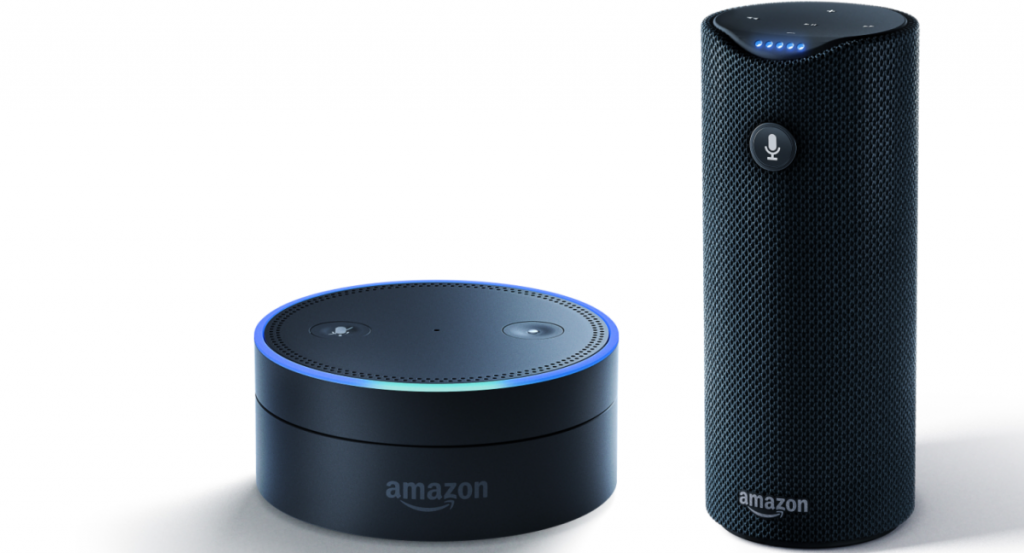Talking to yourself in your house has become more of a reality after a slew of new products using Amazon’s voice assistant were unveiled last week at the Consumer Electronics Show (CES), where the big trends for the future year unfold.
The big trends this year, in no particular order: more sophisticated drones, 4K another high resolution televisions, virtual reality, and artificial intelligence (AI). LG stole the TV show with a screen light enough to hang on the wall. With magnets. The LG Signature W is a mere 2.57mm thin, and 77-inch/1.9m wide.
While the most interesting will ultimately be AI the hottest right now is Alexa, Amazon’s voice assistant that has previously only been available in Amazon’s Echo home speaker. With an array of microphones, which wake up when you say “Hey Alexa”, you can tell the voice service to play music, control your home’s lighting or air-conditioning (if they’re wired up), and – obviously – buy things from Amazon’s e-commerce store.
A range of speakers similar to the black circular Echo were released last week, with the best arguably coming from Chinese PC maker Lenovo, whose Smart Assistant Speaker includes a Harman Kardon speaker in the top-end model. Also announced was the Huawei Mate 9 as the first smartphone to include Alexa pre-installed, while Ford and Volkswagen are including it in their new car software.
Voice assistant services are expected to be big this year, finally showing their full potential. The global market for virtual assistants is expected to be worth US$3.6bn by 2020, according to Allied Market Research.
Apple launched the first consumer assistant Siri, while Google has its own service (Voice Search and recently an Echo-matching speaker called Home), as does Microsoft (Cortana). But Amazon has triumphantly taken the lead through this batch of other manufacturers’ products, and is shaping up to be the winner in this nascent category for a number of reasons.
Voice assistants are essentially just a way to interact with your technology. Speaking to your computer is more user-friendly than a mouse or keyboard, and also more convenient. You’re standing in the kitchen and want to listen to that new version of Leonard Cohen’s Hallelujah by KD Lang or watch the news. You say out loud: “Hey Alexa….” and give it instructions. If you’ve set it up correctly, Alexa will find the song through Spotify or Amazon Prime Music (obviously, its own music streaming service is the default). Or you can instruct it to change TV channels to see what’s on eNCA. Or, just as easily, buy something from Amazon’s store. It pushes Alexa customers to subscribe to Amazon’s $99 a year Prime service (where its available), and to buy more from Amazon itself.
But Amazon has cleverly opened up this Alexa service and allowed others to build what it calls “skills” so it can perform more functions.
Meanwhile Monday was also the 10th anniversary of Steve Jobs’ introduction of the iPhone, the device that launched the smartphone and mobile eras. The internet has been awash in nostalgia for Jobs, the Pied Piper of good design and ease of use, and the glorious big-screened phone that launched a thousand imitators.
It also launched, a few years later, the app economy; which Apple reminded us with its annual press – always released during CES – that it had “its busiest single day ever on New Year’s Day [$240m], capping a record-breaking holiday season”. It said it paid developers over $20bn in 2016, up 40% over the previous year. Since 2008, when Apple opened the App Store, developers have earned over $60bn, it says.
The new app store is Alexa’s set of “skills,” or ways to integrate it with various other services – from music through Spotify, news via Twitter and Bloomberg, and others. Amazon has a significant advantage over its nearest voice-assistant rival Google. It’s going to be interesting to watch it play out.
This column first appeared in Financial Mail
